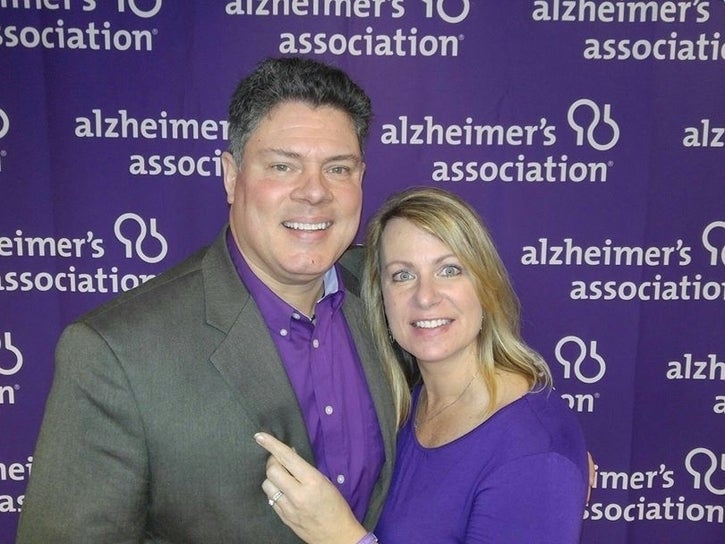Jeff Borghoff was diagnosed with an early onset form of the disease in 2016
By KRISTEN DOWD
The Sun
Jeff Borghoff was given the gift of time on June 7.
The Ocean County resident has been living with early onset Alzheimer’s disease since his diagnosis in early 2016, although his symptoms began even earlier. His type of dementia affects those younger than 65; in 2016, Borghoff was 51.
“The doctors I was seeing didn’t want to go down that path. They were basically telling me I was too young to have Alzheimer’s – which we know is not a fact,” said Borghoff, who sits on the board of the Alzheimer’s Association of Greater New Jersey.
Shortly after his diagnosis, what Borghoff called a “serendipitous” conversation with a neighbor made him aware of an ongoing clinical trial for aducanumab, a drug aimed at slowing the progression of Alzheimer’s disease by targeting proteins in the brain that develop into the plaques disrupting cell function. Borghoff started the trial a few months after his diagnosis, and although there were bumps in the road – the trial was canceled as a futility study in March 2019, but after additional data contradicted that initial decision, a new clinical trial started later that year – Borghoff saw improvement.
“I was kind of steady; I wasn’t going off the deep end,” he recalled of his first clinical trial. “Even still to this day, I am very neutral, very steady. As far as I’m concerned, I’m totally OK with some of the brain damage that has occurred from my Alzheimer’s, as long as this medication will slow the progression.
“I can be where I am now for the next 20 years.”
The likelihood of that happening drastically improved on June 7, when the FDA approved the Biogen company’s aducanumab to treat Alzheimer’s.
“It’s an epic day for us,” Borghoff said. “When you’re first diagnosed with Alzheimer’s, you’re basically understanding that you have a terminal disease that has no cure and no way to slow the progression. Now we do. To me it is the dawn of a new era.
“I couldn’t be more grateful to the FDA, the Alzheimer’s Association, Biogen and my clinical trial center and the trial participants,” he added. “Collectively, this is something that we’ve been fighting for.”
Aducanumab wasn’t approved without controversy. The first clinical trials, Emerge and Engage, failed to demonstrate efficacy. But the new trial, Embark, started seven months later, after additional data determined the drug had positive outcomes. The drug’s exorbitant cost is also a significant detractor; Biogen’s list price is $56,000 annually.
And some questioned the drug’s success rate, which showed improvement in about 25% of cases.
“This is an incremental step … That is not a reason to deny that 25% of the population,” said Randy Lerner, manager of marketing and communications for the Alzheimer’s Association of Greater New Jersey.
Lerner likened the scenario to early treatment of AIDS and its progress since, with some patients living long lives and the disease itself going essentially undetected after treatment.
“You’ve got to give people the hope that this drug can help. This is a great step in the right direction,” Lerner maintained.
Hope, according to Robyn M. Kohn, director of programs and services for the state’s Alzheimer’s Association, is the name of the game.
“It provided us with hope for the future, for all of our families here in New Jersey,” Kohn explained. “We know we have over 190,000 people with a diagnosis of Alzheimer’s and other kinds of dementia (in New Jersey). We have our caregivers as well.
“We’re looking at hundreds of thousands of people who now have hope and promise for tomorrow,” she added. “That is so important.”
Aducanumab is the first drug approved for Alzheimer’s since 2003. It is also the first approved therapy of its kind, modifying the disease as opposed to masking the symptoms.
“The journey begins with one step,” Lerner noted. “This is that first step.”
Borghoff took part in his aducanumab trials through the Advanced Memory Research Institute of New Jersey in Toms River. Though he found out about the trial by talking with his neighbor, he lauded the Alzheimer’s Association’s TrialMatch program, a free service that helps connect people with the disease to clinical trials around the country.
Borghoff said he knows aducanumab isn’t for everyone, and he knows the drug doesn’t come without controversy. But throughout his trials – which he called a “very positive process” – Borghoff knew he had to put that aside and focus on how the drug was working for him and other friends in the trial.
“There are a lot of people out there thinking this is all about making money,” he said. “For a person like me, who’s actually in the clinical trial and seeing the results, that was sort of maddening.
“I understand there are naysayers,” he continued. “I know that this medication does have some side effects and it doesn’t fit everyone. And I also understand that empirical scientific data is absolute. But I think there is so much more to this drug: anecdotal things, personal things. It may have been these things that put it over the finish line.”
On June 7, the FDA’s deadline to decide on aducanumab, Borghoff woke up early. He jumped on his computer and continually refreshed the FDA and Biogen websites and home pages. He stepped away for a few minutes, and that’s when he got a text from a friend with the Alzheimer’s Association.
The drug was approved.
“I couldn’t control my elation,” Borghoff said.
He immediately shared the news with his wife, Kimberly.
“My wife hugged me and said, ‘Now we have more time. Now we have more time with you.’”

